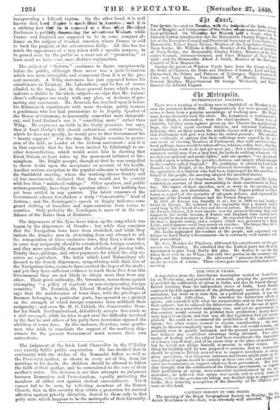30ttrufn1io.
METROPOLITAN POLITICS.
There was a meeting of working men in Smithfield on Monday to dir. cuss the promised Reform Bill. Comparatively few were present, but it seems to have been a genuine assemblage of working men. Mr. Stead. man, house-decorator took the chair. Mr. Longmead, a working-tailor, and Mr. Bligh, a shoemaker, were the chief speakers. Many were old chartists, but they seena.to.have given up the Charter for manhood sal. frage, the ballot, equal electoral districts, and triennial Parliaments, believing that on these points the middle classes will go with them, and that Parliament will give way before the united pressure. The speakers were evidently of opmion that their sufferings were caused by the pre. sent mode of electing Members of Parliament, that with universal man- hood suffrage, taxes would be taken off tea, tobacco, coffee, beer; that they would have less work to do and get more pay; that a labourer is a better and more useful man than a lazy lord, for lords do nothing whatever. "If we had our political and social rights," said one speaker, "we should not be called upon to witness the poverty, distress, and misery which abounds in the country called England." No confidence is placed in Lord John Russell, or Mr. Bright, or the Derby-Disraeli Government. In spite of the opposition of a chartist who had been imprisoned for his exertions nil behalf of the people, the meeting adopted the modified charter.
The two members for Southwark, Sir Charles Napier and Mr. Locke, rendered in account of their stewardship to their constituents on Tues- day. The topics of their speeches, now so worn in the provinces, did not receive any new illustration. Sir Charles Napier pointed to Cher- bourg as a proof of the necessity of adequate defence, and expressed his mistrust of the French alliance and the French Emperor.
In 1815 all Europe was friendly to us ; but in 1858 we had hardly a friend in Europe. He believed it was impossible that a despotic nation could long be the friend of a free and liberal nation. He had no doubt that the French alliance, if it were sincere, was the greatest blessing that could happen to the world, because, if France and England were united, not a shot would be fired in anger in Europe. He repeated that it was not possi- ble that a despotic nation, and a country which was governed bv a King, Lords, and Commons could long march on together. The longer they did SO the better; but it was our duty to look out for a rainy day.
Mr. Locke applauded the conduct of the people, and expressed con- fidence in Lord Derby's Government—he is extremely well satisfied with their proceedings.
Mr. Cox, Member for Finsbury, addressed his constituents on the past session on Thursday. He admitted that the Radical party has all along ' determined to give Lord Derby fair play. He desires to see the day when there will be no Whigs, and only two parties in the country—the People and the Aristocracy. He advocated "pressure from without" on the question of reform. These views gave intense satisfaction to the meeting.


























 Previous page
Previous page